Power Your Store with Experro's Smart AI Shopping Assistant!

What’s Inside
- What Is an AI Shopping Assistant?
- How Do AI Shopping Assistants Work?
- What Can an AI Shopping Assistant Do for Your Customers?
- AI Agents vs Assistants: Key Differences in Functionality & Shopping Experience
- What Are the Key Features Powering AI Shopping Assistants?
- What Are the Advantages of Using AI Shopping Assistants?
- What Are the Categories of AI-Based Shopping Assistants?
- What Are the Use Cases of AI Shopping Assistants?
- What Are the Limitations of AI Shopping Assistants?
- How Can Experro Power Your Business with AI Assistants?
- Conclusion
Key Takeaways
- AI shopping assistants simplify everyday tasks by providing quick answers, managing schedules, and assisting with basic user queries.
- These assistants rely on predefined rules and user commands to function, making them useful for structured interactions.
- Businesses should use AI-based shopping assistants to help customer support staff improve response times and streamline user interactions.
- Experro's AI-driven shopping assistants help eCommerce businesses deliver personalized shopping experiences, improve customer interactions, and boost engagement.
What if you had a personal assistant who could handle shopping, answer queries, and automate tasks instantly?
AI shopping assistants are transforming how we shop with minimal effort, making life easier and businesses more efficient.
From helping customers find products to offering personalized recommendations, these smart shopping assistants are reshaping the eCommerce experience.
Let’s explore more about them!
What Is an AI Shopping Assistant?
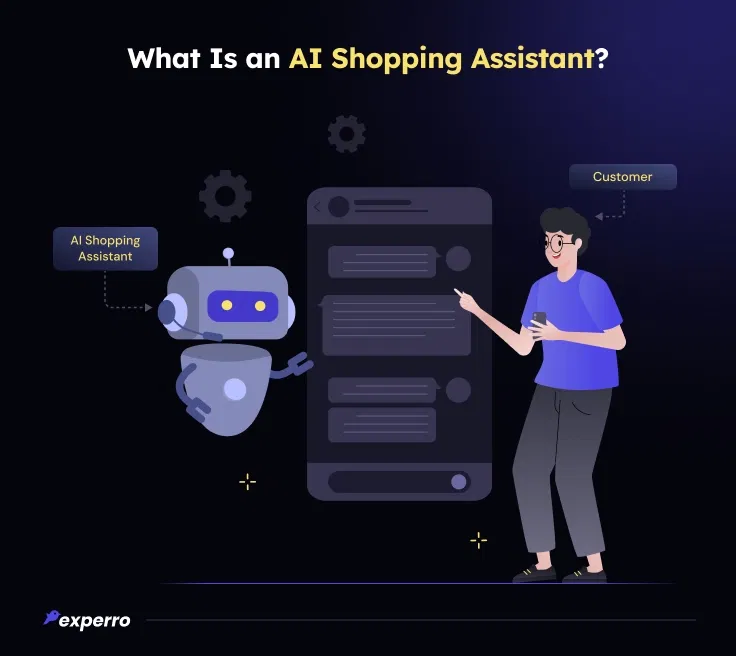
AI shopping assistant definition – An AI shopping assistant is an intelligent virtual agent that acts as a personal shopping guide, helping users navigate vast product catalogs, compare options, get styling advice, and complete purchases effortlessly.
It can process natural language, understand context, and provide human-like interactions. AI-driven shopping assistants are used across industries, from eCommerce to customer service.
AI-driven shopping assistants are used across industries, from eCommerce to customer service, delivering agentic experiences with dynamic, proactive assistance.
How Do AI Shopping Assistants Work?
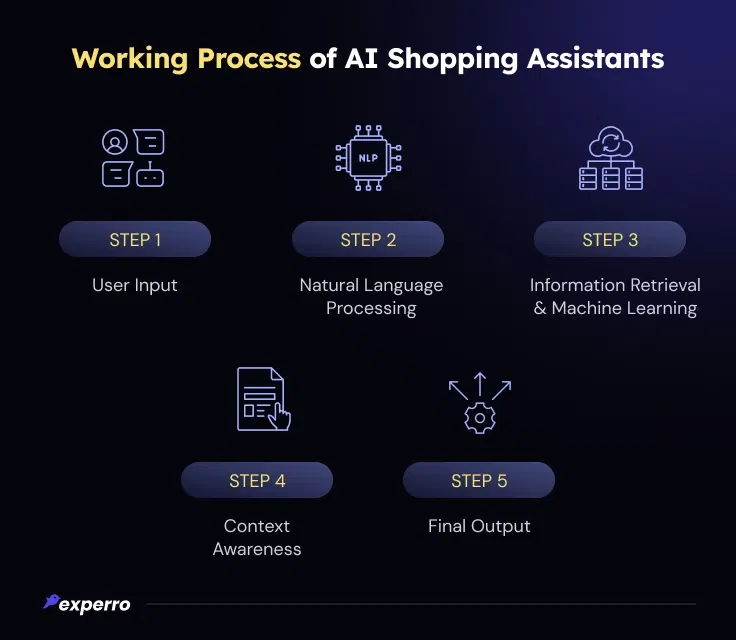
AI-driven shopping assistants follow a step-by-step process to understand user needs and deliver accurate responses.
Here’s how they work:
- User input is received through text, voice, or images, triggering the interaction
- Natural Language Processing (NLP) interprets the input to understand the user's intent.
- Information retrieval and Machine Learning (ML) analyze the request, fetch relevant data, and refine responses based on patterns.
- Context awareness helps the assistant remember past interactions and personalize responses.
- Final output is generated as personalized recommendations within the chat, based on the user’s queries and preferences, rather than profile-based suggestions on the eCommerce screen.
Now that we have learned about the working of AI-driven shopping assistants, let’s dive into what they really can do for your customers to make their journey seamless.
What Can an AI Shopping Assistant Do for Your Customers?
AI shopping assistants are implemented to enhance your customers’ shopping experiences by offering personalized and efficient support throughout the process.
They simplify decision-making and make online shopping smoother by addressing customer needs in real time.
Let’s check its various purposes:
Purpose 1: Answering Queries
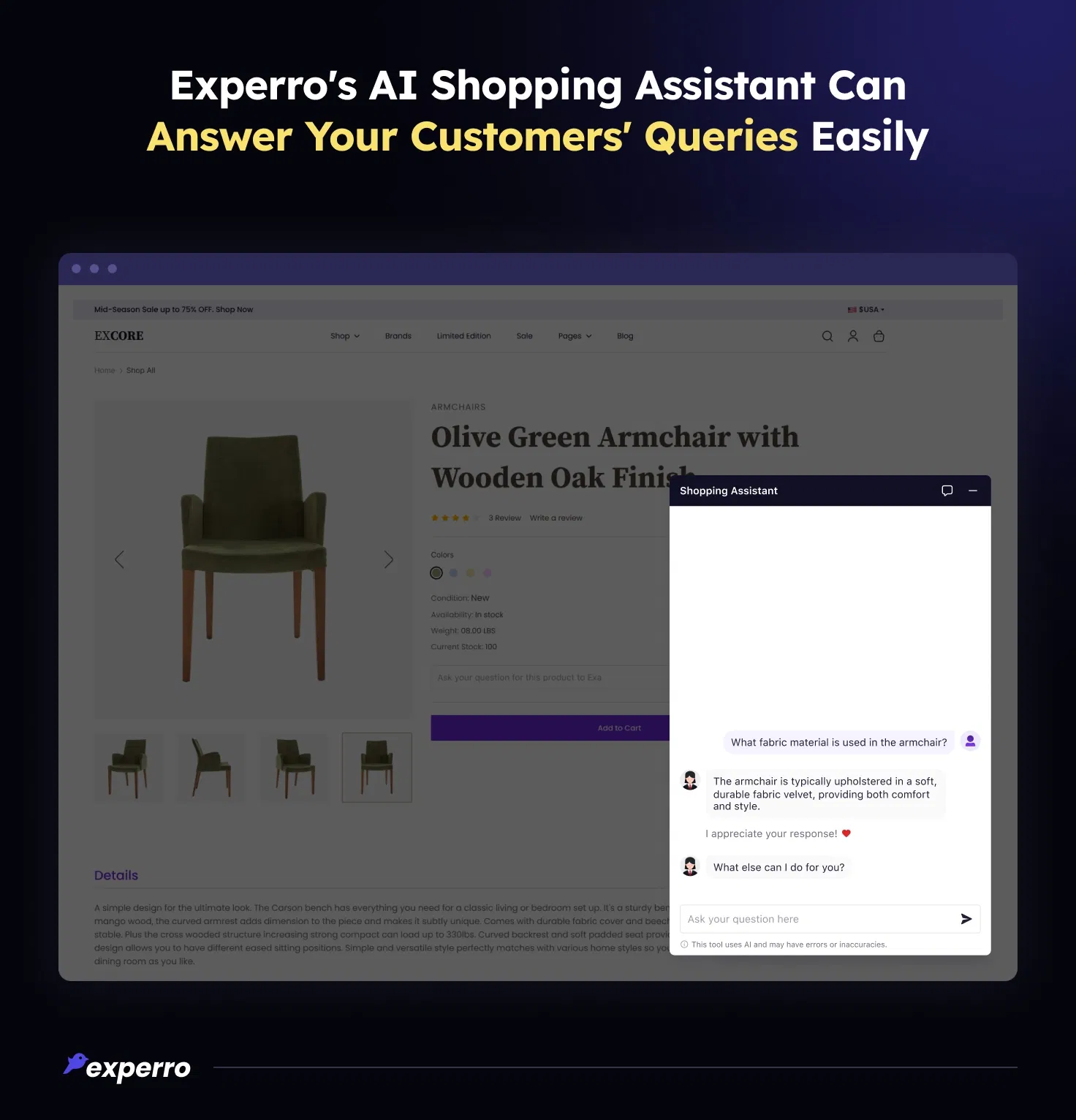
AI shopping assistants can instantly respond to customer questions, providing relevant information about products, policies, and availability.
Whether it's inquiries about sizes, shipping times, or product features, they ensure customers get answers quickly, improving the overall shopping experience.
Purpose 2: Search via Images
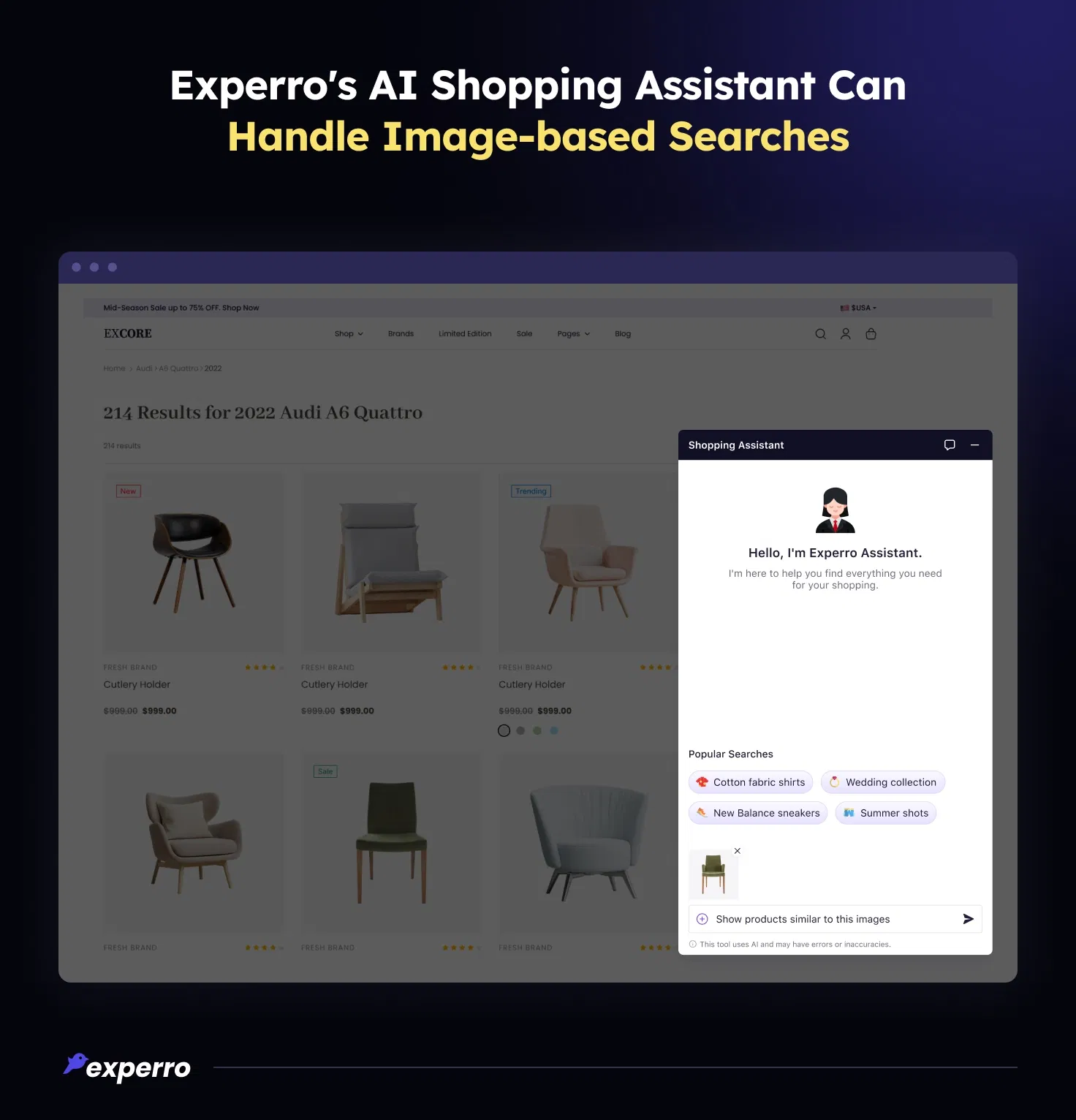
By allowing image-based search, these assistants help users find products visually, making the process faster and more intuitive.
Customers can upload a photo of an item, and the assistant will find similar products, saving time and making the shopping journey more interactive.
Purpose 3: Recommending Products as per Demand
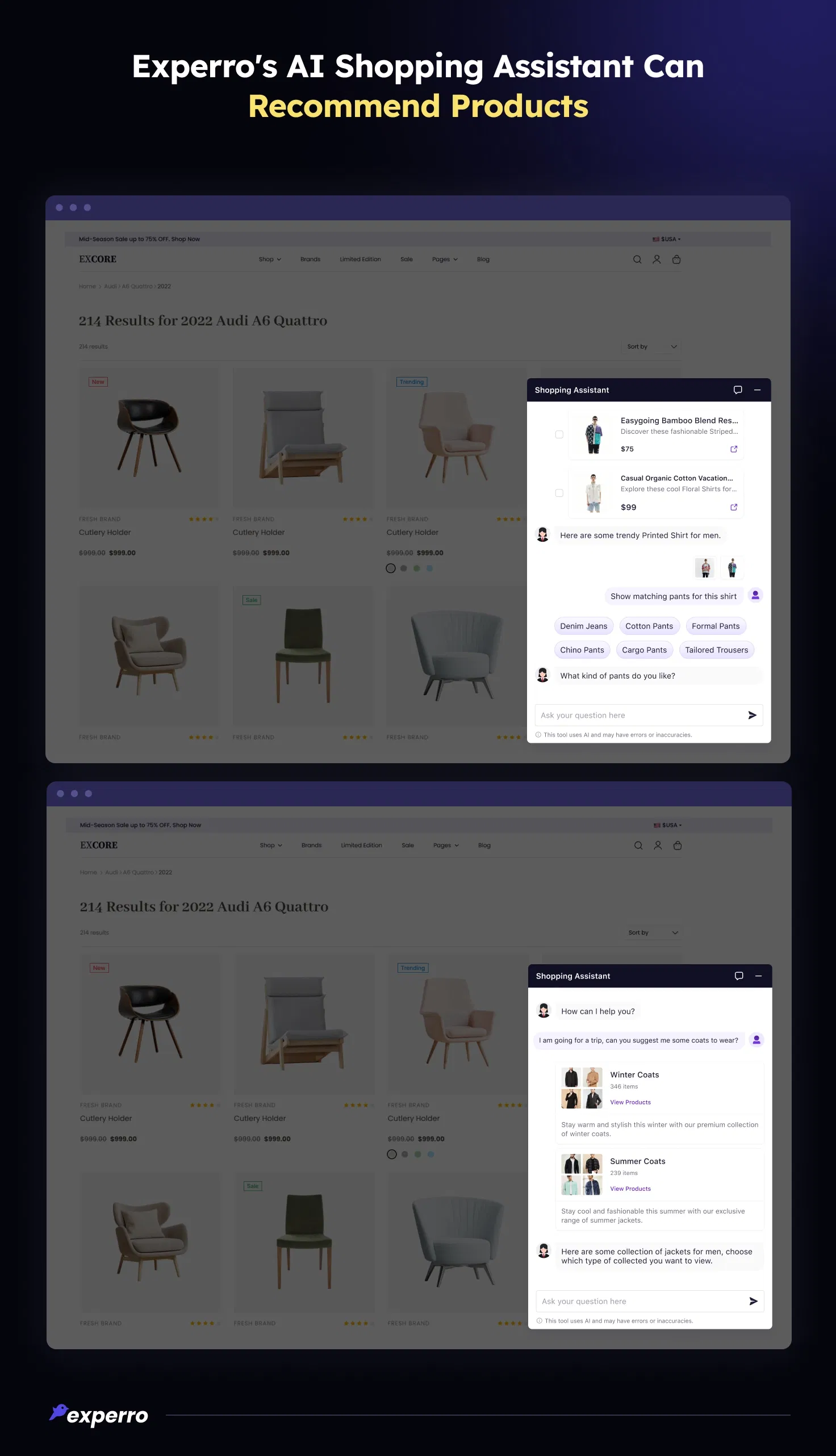
AI assistants suggest products tailored to individual preferences and browsing patterns, ensuring users find exactly what they’re looking for.
This personalized approach not only improves customer satisfaction but also increases the likelihood of a sale by showcasing relevant items.
A survey found that 34% of U.S. consumers are comfortable with AI shopping assistants making purchases for them, showing growing acceptance in shopping.
After being aware of the various purposes of AI-powered assistants, let’s know more about the differences between AI shopping agents and assistants in the next section.
AI Agents vs Assistants: Key Differences in Functionality & Shopping Experience
AI agents and AI-based shopping assistants share similarities but serve different purposes. While both rely on AI, agents act autonomously with minimal user input, whereas assistants are more interactive and user-driven.
| Feature | AI Agents | AI Shopping Assistants |
|---|---|---|
| Autonomy | High autonomy, capable of independent decision-making. | Low autonomy, requires user commands to function. |
| Functionality | Performs complex, multi-step tasks without direct supervision. | Executes predefined tasks like answering questions or providing product recommendations. |
| Learning Ability | Continuously learns from data and adapts behavior over time. | Limited learning as it primarily follows pre-set rules and responses. |
| Task Scope | Handles broad, dynamic tasks like fraud detection, customer segmentation, and automation. | Focuses on user-facing tasks like basic customer support. |
| Decision-Making | Uses advanced AI models to analyze data and make decisions. | Provides information but relies on human input for decisions. |
| Examples | Chatbots with decision-making capabilities, autonomous customer support agents. | Google’s AI shopping assistant and chatbot, basic customer service bots. |
| Business Impact | Automates operations, reduces manual workload, and enhances efficiency. | Improves user experience by assisting with routine queries and tasks. |
What Are the Key Features Powering AI Shopping Assistants?
The future of AI shopping assistants is designed to deliver seamless and intelligent interactions by leveraging advanced technologies.
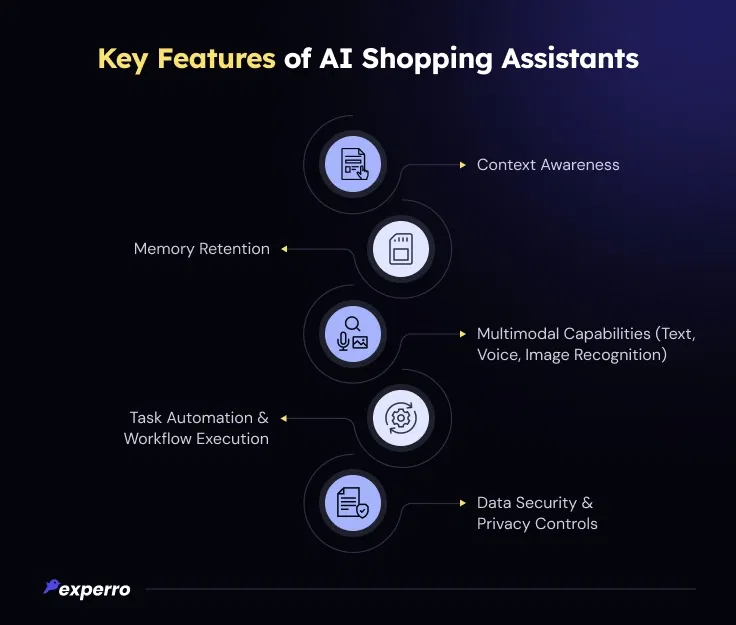
Here are the key AI shopping assistant features and capabilities that enable them to provide accurate, efficient, and personalized assistance.
1. Context Awareness
Shopping AI assistants understand the context of user interactions rather than treating each query as isolated.
They track previous inputs, detect patterns, and adjust responses accordingly. This helps refine recommendations, improve conversational search, and deliver a more natural flow.
2. Memory Retention
Advanced AI agents can remember user preferences, past interactions, and track individual shopping behavior over multiple sessions to assist the users according to the data.
This allows for hyper-personalized experiences, such as suggesting frequently bought items and refining product recommendations based on past choices.
3. Multimodal Capabilities (Text, Voice, Image Recognition)
Modern AI assistants for customers can process and respond to inputs in multimodal search formats, including text, voice, and images.
This enables users to search by speaking, typing, or even uploading images for visual recognition. Such flexibility enhances user convenience and makes shopping experiences more intuitive.
4. Task Automation & Workflow Execution
AI-powered assistants streamline complex processes by automating repetitive tasks. They can assist with order tracking, cart management, and even customer support queries.
By handling these workflows, they reduce manual effort and improve efficiency for both users and businesses.
5. Data Security & Privacy Controls
Since AI shopper assistants handle sensitive user data, robust security measures are essential. They incorporate encryption, anonymization, and strict access controls to protect personal information.
Compliance with consent management and privacy regulations ensures that user data remains confidential and secure.
Now that we are aware of the features of AI-driven shopping assistants, let’s jump into its benefits.
What Are the Advantages of Using AI Shopping Assistants?
AI-driven shopping assistants offer numerous benefits for eCommerce businesses and consumers alike.
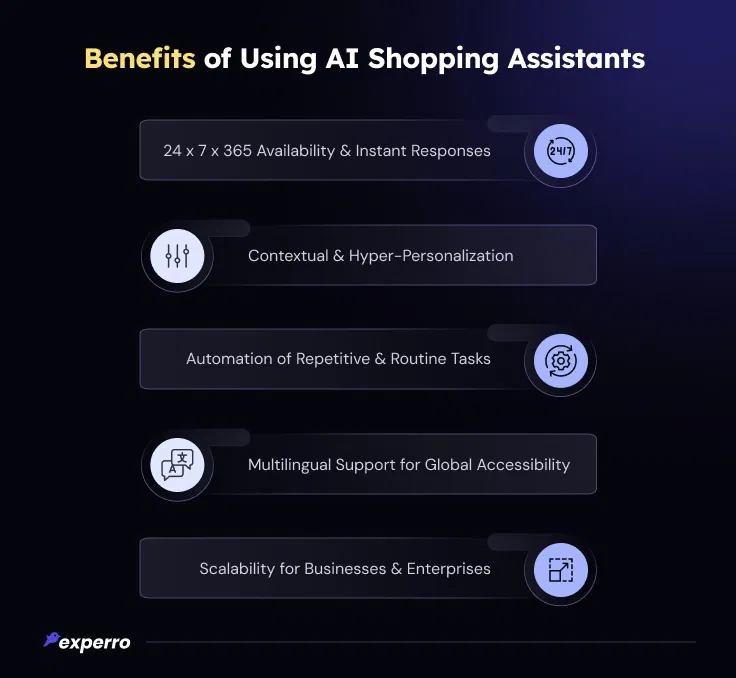
1. 24x7x365 Availability & Instant Responses
Shopping AI assistants provide round-the-clock support, ensuring quick and efficient responses for customers, making them ideal digital shopping assistants.
Unlike human agents, they don’t need breaks, ensuring uninterrupted assistance. This is especially beneficial during peak sale seasons when customer inquiries spike.
By reducing wait times, AI assistants for eCommerce improve customer satisfaction and drive higher conversions.
2. Contextual & Hyper-Personalization
With gen AI-driven personalization, shopping AI assistants analyze preferences to deliver tailored product recommendations, enhancing the AI shopper experience.
They track user behavior, past purchases, and shopping habits to make relevant suggestions. Advanced AI even adapts in real time, refining recommendations as customers interact with the platform.
This personalized approach increases engagement, boosts sales, and builds customer loyalty.
3. Automation of Repetitive & Routine Tasks
Your business can order processing and customer queries, freeing up human resources for more complex tasks.
AI-powered automation reduces errors, speeds up operations, and enhances efficiency. From managing refunds to handling stock or specific product's availability inquiries, AI-based shopping assistants simplify backend workflows.
This allows your business to focus on innovation and strategic growth rather than manual, time-consuming tasks.
4. Multilingual Support for Global Accessibility
AI shopping assistants cater to international website visitors with multilingual capabilities, breaking language barriers in eCommerce.
This is crucial for businesses expanding into new markets, ensuring seamless communication with a diverse audience.
With real-time translation and localization, AI assistants enhance the AI-driven shopping experience for global shoppers. They also improve customer support, making brands more accessible worldwide.
5. Scalability for Businesses & Enterprises
AI assistants grow with businesses, handling increasing customer interactions without compromising efficiency.
As your company expands, AI-powered shopping assistant software ensures smooth scaling without needing a proportional increase in human agents.
These assistants can manage high traffic during holiday seasons, special promotions, and flash sales. Their ability to learn and optimize over time further enhances operational efficiency, making them an asset for long-term growth.
Now, let’s check its categories.
What Are the Categories of AI-Based Shopping Assistants?
AI assistants for shopping come in various forms, each designed to serve specific needs.
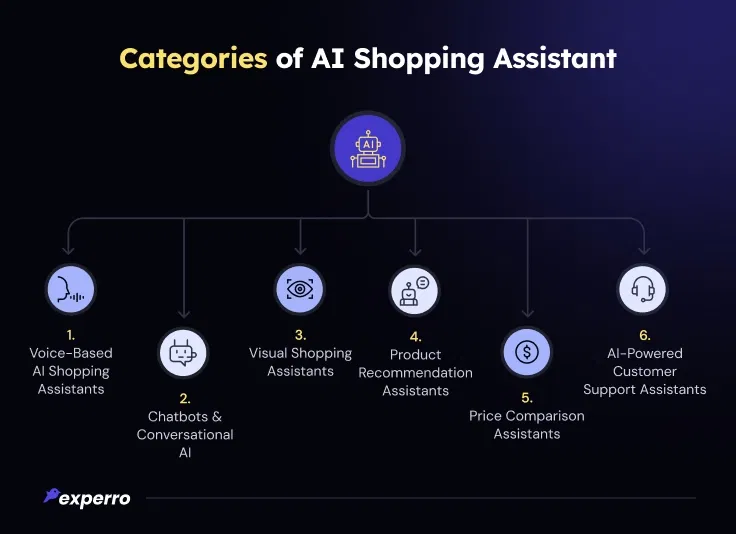
1. Voice-Based AI Assistants
These shopping assistants, like Siri and Alexa, use voice recognition to interact with users. In retail, they help shoppers find products through voice commands, enhancing the AI-driven online shopping assistant experience.
With the rise of voice commerce, they also enable seamless hands-free purchases, making shopping journeys more convenient.
2. Chatbots & Conversational AI
Chatbots engage users through text-based conversations. They handle customer’s order status inquiries, recommend products, and improve conversions for eCommerce companies using gen AI-powered personal shopping assistants.
As a key player in conversational commerce, they enhance customer interactions, reducing friction in the buying process.
3. Visual Shopping Assistants
These assistants enable users to search for products using images instead of text. By analyzing images, they can recommend similar or matching products, providing a visually driven shopping experience.
With visual search, customers can quickly find items that match the style, color, or design of what they’re looking for, simplifying the shopping process.
4. Product Recommendation Assistants
These AI-driven assistants analyze browsing and purchase history to offer personalized product suggestions, enhancing product discovery and increasing conversions.
By predicting customer preferences, they help customers find relevant products they may not have considered, improving user experience and sales potential.
5. Price Comparison Assistants
AI-powered price comparison assistants help users compare prices across multiple retailers, ensuring they find the best deals available before making a purchase.
They also provide price tracking features, alerting users when prices drop, which can increase customer loyalty and satisfaction.
6. AI-Powered Customer Support Assistants
These assistants provide quick responses to customer inquiries, assist with returns or exchanges, and address common issues, improving overall customer satisfaction and support efficiency.
With 24x7x365 availability, they offer constant support, reducing response times and operational costs while maintaining high-quality service.
Now that we have explored the categories, let’s dive deeper into the benefits of AI-based shopping assistants.
What Are the Use Cases of AI Shopping Assistants?
AI shopping assistants are widely used in the eCommerce industry.
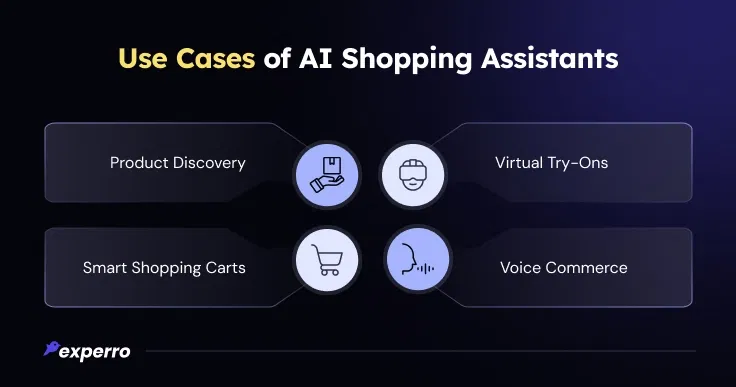
Here are some AI shopping assistant use cases:
1. Product Discovery
Generative AI shopping assistants recommend items based on customer preferences and browsing behavior.
By analyzing real-time interactions, they refine suggestions to match individual tastes. This enhances the AI-driven shopping experience, making product and content discovery seamless and engaging.
2. Virtual Try-On
AI clothes shopping assistants enable customers to visualize apparel before purchasing. Using AR and AI, shoppers can see how an outfit fits their body type, in turn reducing abandoned carts.
This feature enhances confidence in purchasing decisions, improving overall customer satisfaction.
3. AI-Powered Smart Shopping Carts
AI-powered shopping assistants suggest complementary products, increasing sales. By analyzing shopping patterns, they provide cross-sell and upsell recommendations tailored to each user.
This boosts revenue and enhances convenience for shoppers by curating relevant product bundles.
4. Voice Commerce
Voice-based AI shopping assistants simplify product searches and order placements. Customers can make hands-free purchases, check order status, and even get personalized gen AI-based recommendations using voice commands.
This improves accessibility, making shopping faster and more intuitive.
What Are the Limitations of AI Shopping Assistants?
While AI shopping assistants bring efficiency and automation, they still have limitations. Their effectiveness depends on product data quality, contextual understanding, and ethical considerations.
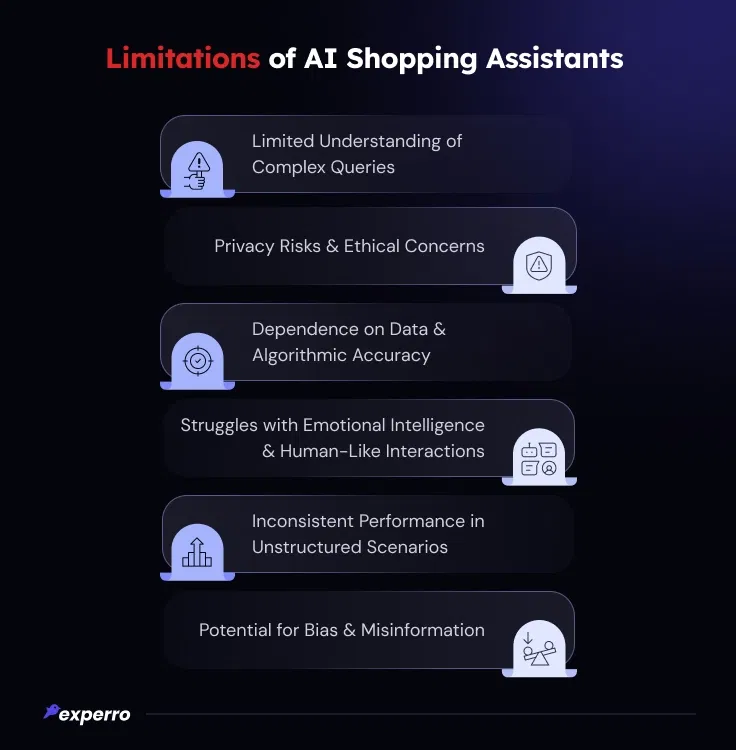
Addressing these challenges is crucial to making them more reliable and user-friendly.
1. Limited Understanding of Complex & Abstract Queries
They may struggle with ambiguous or nuanced questions, leading to inaccurate responses. Complex multi-step queries or highly specific product searches can confuse AI, resulting in irrelevant suggestions.
AI also faces difficulties in understanding cultural or contextual nuances, limiting its effectiveness in global markets.
Experro’s AI-powered shopping assistant software refines search relevance using advanced AI assistant technology, ensuring more precise and meaningful responses.
2. Privacy Risks & Ethical Concerns
AI assistants handle sensitive data, raising concerns about security and ethical AI use. There is a risk of data breaches without proper encryption and compliance measures.
Ethical concerns regarding how AI collects, stores, and utilizes customer data also arise.
Experro ensures secure data handling in its gen AI shopping assistant tools, prioritizing privacy and compliance to build consumer trust.
3. Dependence on Data & Algorithmic Accuracy
Poor data quality can impact AI performance, leading to errors in recommendations or bad personalization. If training data is outdated or biased, AI-powered shopping assistants may suggest irrelevant or misleading products.
Continuous learning and real-time data updates are essential for improving accuracy.
Experro AI shopping assistant leverages adaptive learning to enhance recommendation precision and refine results.
4. Struggles with Emotional Intelligence & Human-Like Interactions
AI lacks emotional depth, making human-like interactions less natural. It struggles to detect sarcasm, frustration, or sentiment shifts, often leading to robotic responses.
This can impact customer satisfaction, especially in support interactions.
Experro provides eCommerce analytics into its AI shopping assistant capabilities, making interactions more intuitive and customer-friendly.
5. Inconsistent Performance in Unstructured Scenarios
In unpredictable conversations, AI shopping assistants may fail to provide relevant responses. They rely on predefined patterns and may struggle when users deviate from expected inputs. This can result in confusing or generic replies.
Experro’s AI assistant for shopping adapts to real-time data and evolving queries, improving AI’s flexibility in handling diverse interactions.
6. Potential for Bias & Misinformation
AI models can reflect biases present in training data, affecting recommendations. Biased data can lead to unfair product suggestions, limiting inclusivity and diversity.
Misinformation can also arise if AI assistants pull from unreliable sources.
Experro ensures unbiased AI recommendations by continuously monitoring and refining training datasets for fair, accurate, and diverse shopping suggestions.
How Can Experro Power Your Business with AI Assistants?
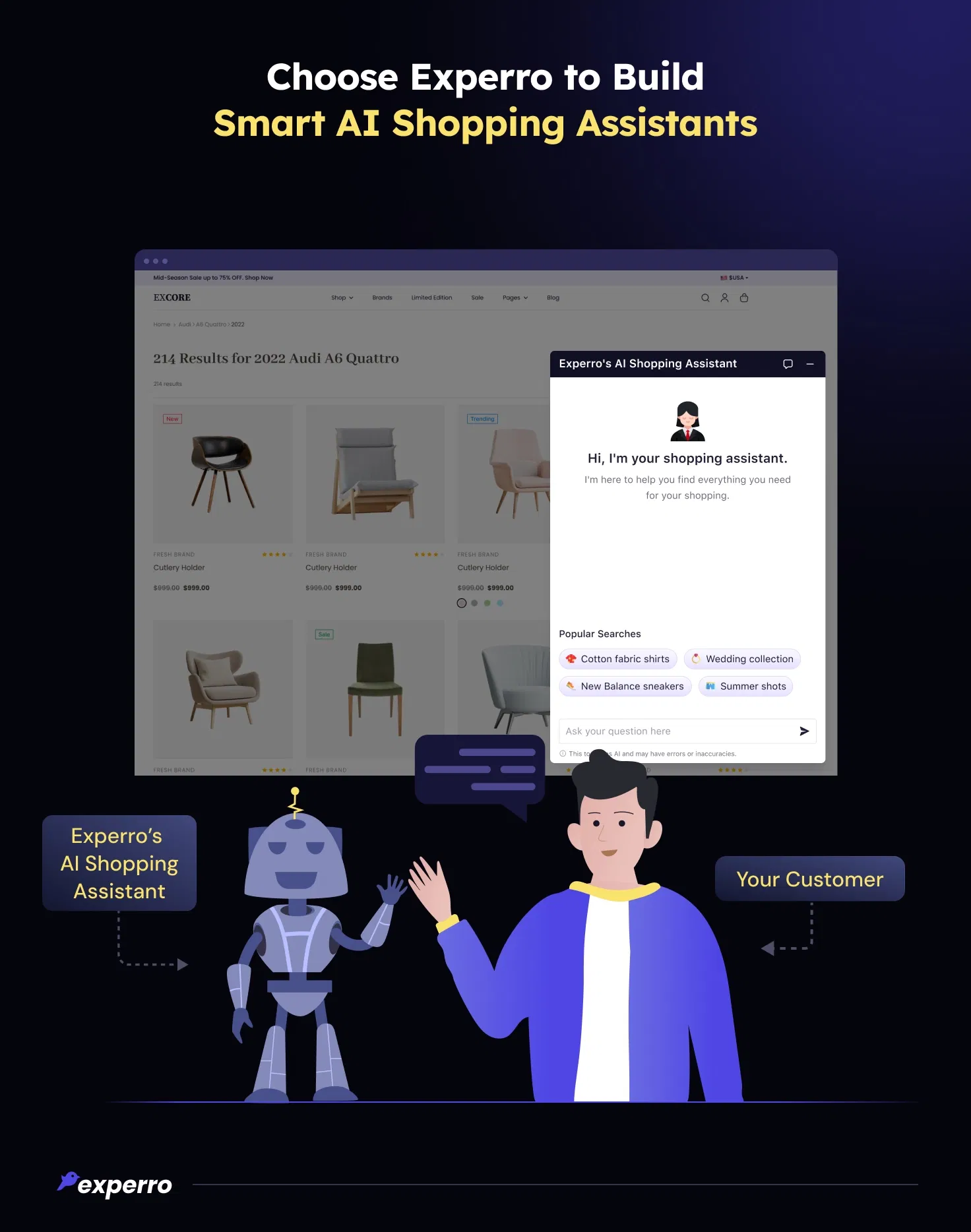
Agentic experience platforms like Experro come with built-in AI-powered assistants that can help your business enhance customer interactions and streamline operations.
With Experro AI shopping assistant software, the platform ensures seamless engagement across channels, making eCommerce more efficient.
Such assistants enable personalized product discovery, guiding shoppers with tailored recommendations.
They optimize the checkout process, reducing friction and boosting conversions.
By automating customer support, they enhance response times and improve overall satisfaction.
Ready to get the best AI shopping assistants for your business? - Experro is here to power your success.
Conclusion
AI assistants for shopping are transforming eCommerce with intelligent automation and personalization. While they have limitations, their key benefits far outweigh the challenges.
They enhance shopping experiences, streamline operations, and drive higher conversions.
Businesses looking to enhance customer engagement should leverage AI-powered shopping assistants. Schedule a call with our experts to know more.
FAQs


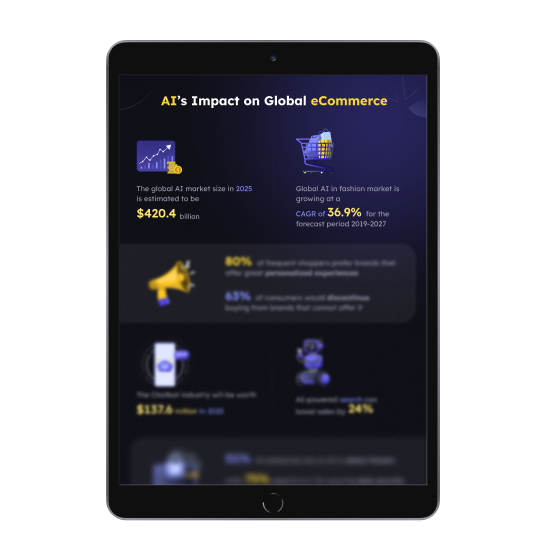
Pallavi Dadhich
01 April 2025Pallavi is an ambitious author known for her expertise in crafting compelling content across various domains. Beyond her professional pursuits, Pallavi is deeply passionate about continuous learning, often immersing herself in the latest industry trends. When not weaving words, she dedicates her time to mastering graphic design.